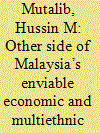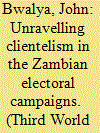|
|
|
Sort Order |
|
|
|
Items / Page
|
|
|
|
|
|
|
| Srl | Item |
| 1 |
ID:
191639


|
|
|
|
|
| Summary/Abstract |
Despite increasingly programmatic politics and competitive elections, political clientelism remains an enduring feature of African politics. More so, while politicians rarely deliver on political promises, citizens continue to demand and participate in patron–client relations. While moral economy and instrumentalist accounts offer insight into the puzzling persistence of political clientelism, we offer an additional framework based on demands for social recognition. Beyond expectations of materialist exchange or the performance of cultural norms, citizens expect their political leaders to recognize them as dignified human beings and members of an identity group. Drawing on evidence from three diverse African contexts—urban Ghana, rural Senegal, and coastal Kenya—we argue that citizens engage in political clientelism as a vehicle for demanding three dimensions of social recognition: (i) To be seen and heard by leaders, (ii) to be respected as agents in the political process, and (iii) to be politically included and protected from harm. By providing new insights into the enduring logics of clientelism, citizen strategies amidst unequal power relationships, and the role of emotions in democratic politics, we aim to reconcile existing approaches and bring them into a more unified framework.
|
|
|
|
|
|
|
|
|
|
|
|
|
|
|
|
| 2 |
ID:
151472


|
|
|
|
|
| Summary/Abstract |
Many governments, in their zeal to progress and deliver the fruits of development, are caught in a web of unsavory habits and practices that impair not only their international image but also domestic legitimacy. One such perennially persistent and resilient disease is ‘money politics.’ Taking Malaysia as a case study, we note that despite sustaining a remarkable record of economic and multiethnic stability, the country has also been helpless in mitigating this obstinate issue. In this article, it is posited that the phenomenon is not a new or recent portent but has actually persisted even prior to independence. We shall then contend that unless the ruling Barisan Nasional (BN) coalition government attaches greater priority in stamping out this political bug, the country’s otherwise enviable development trajectory and the quest to reach a ‘developed nation’ status via its Vision 2020 declaration, even if fulfilled, are not cause for celebration, given its implications to the country’s economic sustainability and multiethnic stability.
|
|
|
|
|
|
|
|
|
|
|
|
|
|
|
|
| 3 |
ID:
145184


|
|
|
|
|
| Summary/Abstract |
Debates over whether democracy or political clientelism would drive the politics of development in Africa have increasingly given way to more nuanced readings that seek to capture the dynamic interplay of these forms of politics. However, most current analyses struggle to identify the specific causal mechanisms through which politics shapes the actual distribution of resources. A political settlements approach, which emphasizes the distribution of ‘holding power’ – the ability to engage and survive in political struggles – within ruling coalitions, and how this shapes institutional functioning, can bring greater clarity to these debates. Our analysis shows that patterns of resource allocation within Ghana's education sector during 1993–2008 were closely shaped by the incentives generated by Ghana's competitive clientelistic political settlement, which overrode rhetorical concerns with national unity and inclusive development. This had particularly negative implications for the poorest northern regions, which have lacked holding power within successive ruling coalitions.
|
|
|
|
|
|
|
|
|
|
|
|
|
|
|
|
| 4 |
ID:
155006


|
|
|
|
|
| Summary/Abstract |
The hallmark of accountability in a democracy centres on the way the elected parliament holds the executive to account. If the parliament does not perform its oversight role effectively, lower authorities would have fewer incentives to do the same vis-à-vis local executives. In this article we therefore ask whether or not different meanings of accountability can be discerned amongst Tanzanian Members of Parliament (MPs). In our Q-method research we found four clearly identifiable discourses on accountability amongst Tanzanian MPs: Partycrats; My Electorate's Advocates; Frustrated Account Holders; and Pragmatic Account Holders. We understand MPs discourses within the broader context of political clientelism and we argue that this combination of discourses, or accountability culture, enables the executive to rule in semi-autocratic ways. Even if opposition parties would obtain a parliamentary majority, this accountability culture stands in the way of achieving greater democratic responsiveness.
|
|
|
|
|
|
|
|
|
|
|
|
|
|
|
|
| 5 |
ID:
154072


|
|
|
|
|
| Summary/Abstract |
Based on reports on selected parliamentary by-elections from 2009 to 2015 and two presidential elections in 2011 and 2015 in Zambia, this paper examines the political rhetoric to determine the presence and nature of clientelism in Zambian electoral campaigns. Zambia’s three leading newspapers, The Post, Times of Zambia and Zambia Daily Mail, were searched for reports of electoral campaigns. In total, 605 issues of each of the three newspapers spanning a period of 20 months were used. The paper concludes that a blend of vote buying and turnout buying were more evident in the campaign rhetoric in parliamentary by-elections than the presidential elections. Further, the ruling parties extended their clientelistic rhetoric to include perverse accountability.
|
|
|
|
|
|
|
|
|
|
|
|
|
|
|
|
|
|
|
|
|